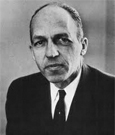David A. Karnofsky, MD, dedicated himself to the pursuit of scientific excellence and the investigation of more effective therapies for cancer for nearly 30 years, from the time he was a young resident at the Collis P. Huntington Memorial Hospital for Cancer Research of Harvard University, until his death from lung cancer on August 31, 1969.
Dr. Karnofsky’s early research discoveries at Memorial Hospital–Sloan-Kettering Institute (now Memorial Sloan Kettering Cancer Center) in New York led to the development of numerous chemotherapeutics, including the first oral alkylating agent triethylenemelamine, the glutamine antagonists azaserine (NSC 742) and 6-diazo-5-oxo-L-norleucine (DON), and two breakthrough agents widely used today in the treatment of childhood leukemias, daunorubicin and asparaginase (Elspar).
Disciplined Approach to Oncology
Dr. Karnofsky’s meticulous attention to the clinical evaluation of drugs, which brought hard-data reliant objectivity and discipline to cancer research, is one reason he is credited with helping establish the field of oncology as a specific medical discipline. His creation in 1949 of the Karnofsky Performance Scale (along with another early pioneer of cancer chemotherapeutics, Joseph H. Burchenal, MD) is another.
Modern Age of Chemotherapy
In 1942, Dr. Karnofsky began studying the biological activities of mustard gas, a chemical warfare agent, at the Mount Desert Island Biological Laboratory in Maine. He continued that research after joining the Army Chemical Warfare Service, then a branch of the U.S. Army. It was while in the Army that Dr. Karnofsky became interested in the antineoplastic activity of nitrogen mustard (mechlorethamine [Mustargen]), which had been found to be effective, albeit briefly, against lymphoma.
His commanding officer at the time was C.P. Rhodes, MD, on leave as Medical Director of the Memorial Hospital for Cancer. At the end of World War II, in 1945, Dr. Karnofsky joined Dr. Rhodes at Memorial Hospital and, with Dr. Burchenal, launched the first organized clinical chemotherapy program in the country, and continued studies of nitrogen mustard and other antitumor cancer drugs.
“It was these experiences, many of us believe, that initiated the modern era of cancer chemotherapy,” said Irwin H. Krakoff, MD, in his remarks at the 24th Annual David A. Karnofsky Memorial Lecture, which were later published in the Journal of Clinical Oncology.1
Honoring the Early Cancer Pioneers
After Dr. Karnofsky’s death, a group of his friends donated money to ASCO to fund a yearly lecture at ASCO’s Annual Meeting, and in 1970, ASCO launched a permanent memorial to honor Dr. Karnofsky’s body of work with the David A. Karnofsky Memorial Award and Lecture. The Award, which is presented at ASCO’s Annual Meeting, recognizes oncologists who have made outstanding contributions in the areas of cancer research, diagnosis, and/or treatment and is the Society’s highest scientific honor.
The 2014 recipient of the Karnofsky Award is H.M. (Bob) Pinedo, MD, PhD, a pioneer in the field of immunotherapy.
At the time of his death, Dr. Karnofsky was Chief of the Medical Oncology Service and Head of the Division of Chemotherapy Research at the Sloan-Kettering Institute for Cancer Research, Professor of Medicine at Cornell University Medical Center, and a physician at The New York Hospital.
The 2014 Karnofsky lecture was presented on May 31, 2014, at the ASCO Annual Meeting. ■
Reference
1. Krakoff IH: The 24th annual David A. Karnofsky memorial lecture. Progress and prospects in cancer treatment: The Karnofsky legacy. J Clin Oncol 12:432-438, 1994.


